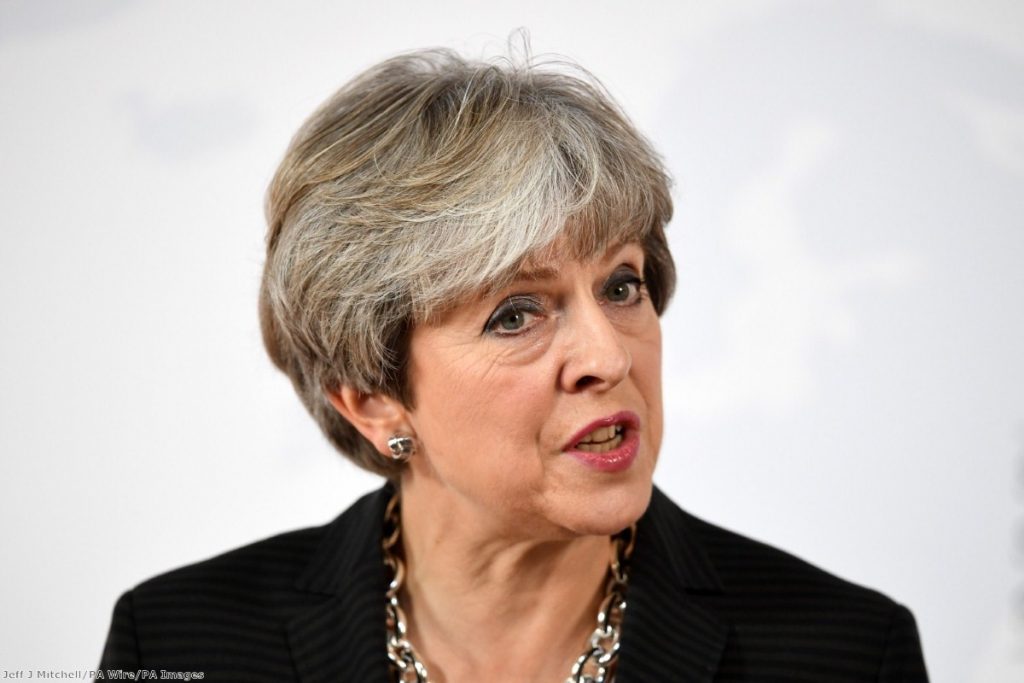Theresa May has a relatively good chance of moving onto the second phase of negotiations this week. Jean Claude Juncker said as much during his press conference with her today. But even if she manages it, it'll be by making concessions which ultimately destroy her – just as surely as she would be destroyed by not making them. It could happen now. Or it could happen later. But it'll happen. There is no escape route.
The problem is of her own making. In October last year, she promised to leave the single market and customs union. She should not have done this. She was fresh in her premiership and strong in the polls. That was the time to face down the impossible demands of the hard right of her party.
Instead, she rashly promised an extreme Brexit. This meant there would be a border in Ireland. It is impossible to avoid this once you're outside the single market and customs union. You need to check that goods and services are of the required regulatory standard, that the correct tariffs have been paid and that products originated where they say they have.
Brexiters largely pretended this problem did not exist, but problems do not disappear because you close your eyes. They remain there.


Today, May finally opened her eyes and found that the problem had been sat there all along, waiting for her to pay attention. Reports suggest the UK government is prepared to accept "regulatory alignment" between Northern Ireland and the Republic of Ireland "in the absence of agreed solutions".
Political leaders in Scotland, Wales and London have seized on this as a way of trying to carve out their territory from the rest of the UK, allowing them to stay in the single market and customs union. But they are premature. The promise only stands if no solution is found. That allows us to get onto future trade talks, with the Irish border problem destroying the project slightly later on.
But ultimately, that is just a questioning of timing. It does not change what will happen, just when it happens. Despite all the months of David Davis chuntering on about 'creative' and 'high-tech' solutions to the Irish issue, none exist. Even this regulatory alignment solution doesn't add up to it. Sure, you can promise to have the same standards as the EU, but you will still need to check goods for tariffs and country of origin. Trade agreements can make that process much easier, but they won't eradicate it altogether.
Even that is getting ahead of ourselves. Well before then, May's regulatory promise will tear her apart at home. Her first problem is Arlene Foster, who recognises what the implications are. After all, if Northern Ireland and Ireland are aligned, then the actual non-aligned border will be in the Irish sea. It therefore follows that we are witnessing the end of the United Kingdom as a unified trading entity and the requirement of border infastructure between the mainland and Northern Ireland. The DUP won't stand for that and would happily take away their crucial support for the government over it.
That would leave May only one option, which is to extend the regulatory alignment from Northern Ireland across all of the UK. That means we would either stay in the single market and customs union or – much more likely – promise to stay signed up to all the EU rules into the future, as Cabinet wets like Philip Hammond and Amber Rudd want. But if she does that, the hard Brexiter lunatics on the front bench, like Boris Johnson and Michael Gove, will join forces with those outside it, like Iain Duncan Smith, and bring her down.
May has three choices, all of which break her. If she insists on a border in Ireland, the talks break down and she is finished. If she insists on a border in the Irish sea, the DUP pull the plug on her parliamentary deal and she is finished. If she accepts regulatory alignment for the whole of the UK, the Cabinet hawks revolt and she is finished. Whatever happens, it's hard to see how she survives.
May might be able to squeak through this week. That line – "in the absence of agreed solutions" – might just defer judgement day on the Irish problem until some point in the future. But the problem will not go away, any more than it would go away after she originally made her conference speech. The dynamics of the Brexit process make survival impossible. Her best chance was right at the start, where a commitment to soft Brexit could have sidestepped the problems she'd face down the road. Instead, she threw in her lot with the hard right of her party. And that sealed her fate.
Ian Dunt is the editor of Politics.co.uk. The new edition of his book – Brexit: What The Hell Happens Now? – is out now.
The opinions in politics.co.uk's Comment and Analysis section are those of the author and are no reflection of the views of the website or its owners.









